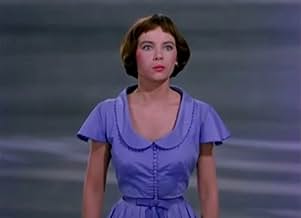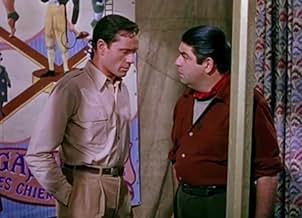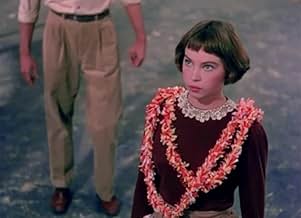ÉVALUATION IMDb
7,2/10
4,3 k
MA NOTE
Une jeune femme orpheline fait partie d'un numéro de marionnette et établit une relation avec un marionnettiste antisocial.Une jeune femme orpheline fait partie d'un numéro de marionnette et établit une relation avec un marionnettiste antisocial.Une jeune femme orpheline fait partie d'un numéro de marionnette et établit une relation avec un marionnettiste antisocial.
- Director
- Writers
- Stars
- A remporté 1 oscar
- 7 victoires et 9 nominations au total
Jean-Pierre Aumont
- Marc
- (as Jean Pierre Aumont)
Jane Adrian
- Nautch Dancer
- (uncredited)
Nick Borgani
- Carnival Patron
- (uncredited)
Gene Conklin
- Whistler in Ballet Sequence
- (uncredited)
Paul Cristo
- Carnival Patron
- (uncredited)
George Davis
- Workman
- (uncredited)
Jeannine Ducasse
- French Girl
- (uncredited)
Bess Flowers
- Carnival Patron
- (uncredited)
Richard Grayson
- Flirting Vendor
- (uncredited)
Avis en vedette
LILI, the 1953 film starring Leslie Caron in the title role, is one of the first examples of a screenplay being turned into a stage musical (CARNIVAL). Though it is common these days for Broadway to find inspiration in film sources, it was highly unusual at the time. It began life as a short story, with inspiration from the KOOKLA, FRAN AND OLLIE television program. Later made into a dark and unusual novella of sexual awakening, the tale was then adapted for the screen as LILI, a film which became the sleeper hit of 1953, eventually running in the same New York City theatre for almost 2 years. It's one, beautifully utilized song, "Hi Lili, Hi Lo" was an enormous hit and contributed to LILI's popularity.
The story, concerning the sexual and emotional coming of age of a young French girl, is unusual for its Freudian overtones and stark emotional mood. When young Lili (Leslie Caron in a gorgeously crafted and heartbreaking performance) comes to a small French village, looking for a family friend, she is devastated to learn that he has died. Without friends or family, she begs a job from a local merchant who sees her desperation as a sexual opportunity. When the merchant tries to rape Lili, she is saved by Marc, the handsome magician of a traveling carnival (Jean-Pierre Aumont). On Marc she foists all of her adult and childhood needs, her bursting sexuality along with her need to be cared for and loved. Eventually she begins working with the carnival but proves a terrible disappointment as a waitress in the carnival cafe. Lonely and desperate, she attempts to kill herself but is saved once again; this time by Paul the carnival puppeteer (a dashing Mel Ferrer in a fine performance) who speaks to her through his puppets, kindly Carrot Top, vain Marguerite, wily Reynaldo the Fox and innocent Horrible Henry the Giant. Paul, a former dancer, crippled years earlier in an accident, is full of anger and resentment but takes pity on Lili, who is so charmed by the puppets that, like a child, she forgets his presence.
The film explores their turbulent relationship as Lili becomes the star of the Carnival, charming patrons with an uncanny ability to speak to the puppets as if they are real. Complications arise as Paul begins to realize his own affection for Lili, while Lili continues to be infatuated with the magician, who's assistant (Zsa Zsa Gabor) is his wife.
With fine performances all around and an unusual atmosphere, the film has something of a cult following and is highly regarded for its frank and emotional nature. With its full-color cinematography, adorable puppets and carnival setting, this film might be mistaken for a children's story but deals, rather, with powerful adult themes. LILI may seem tame by today's standards, but given the conservativism of the 1950's as well as the strict production code in force at the time, LILI is rather shocking.
There is a very unusual dream sequence late in the movie which attempts to explore certain aspects of Lili's psyche through dance. This sequence is not entirely successful, but manages to get its point across and leads directly to the film's moving final moment. It's subtle treatment of a difficult subject is inspiring. The loss of innocence, the retreat from childhood and the desperate need for someone to love prove compelling subjects in a film that is, though imperfect, haunting.
The story, concerning the sexual and emotional coming of age of a young French girl, is unusual for its Freudian overtones and stark emotional mood. When young Lili (Leslie Caron in a gorgeously crafted and heartbreaking performance) comes to a small French village, looking for a family friend, she is devastated to learn that he has died. Without friends or family, she begs a job from a local merchant who sees her desperation as a sexual opportunity. When the merchant tries to rape Lili, she is saved by Marc, the handsome magician of a traveling carnival (Jean-Pierre Aumont). On Marc she foists all of her adult and childhood needs, her bursting sexuality along with her need to be cared for and loved. Eventually she begins working with the carnival but proves a terrible disappointment as a waitress in the carnival cafe. Lonely and desperate, she attempts to kill herself but is saved once again; this time by Paul the carnival puppeteer (a dashing Mel Ferrer in a fine performance) who speaks to her through his puppets, kindly Carrot Top, vain Marguerite, wily Reynaldo the Fox and innocent Horrible Henry the Giant. Paul, a former dancer, crippled years earlier in an accident, is full of anger and resentment but takes pity on Lili, who is so charmed by the puppets that, like a child, she forgets his presence.
The film explores their turbulent relationship as Lili becomes the star of the Carnival, charming patrons with an uncanny ability to speak to the puppets as if they are real. Complications arise as Paul begins to realize his own affection for Lili, while Lili continues to be infatuated with the magician, who's assistant (Zsa Zsa Gabor) is his wife.
With fine performances all around and an unusual atmosphere, the film has something of a cult following and is highly regarded for its frank and emotional nature. With its full-color cinematography, adorable puppets and carnival setting, this film might be mistaken for a children's story but deals, rather, with powerful adult themes. LILI may seem tame by today's standards, but given the conservativism of the 1950's as well as the strict production code in force at the time, LILI is rather shocking.
There is a very unusual dream sequence late in the movie which attempts to explore certain aspects of Lili's psyche through dance. This sequence is not entirely successful, but manages to get its point across and leads directly to the film's moving final moment. It's subtle treatment of a difficult subject is inspiring. The loss of innocence, the retreat from childhood and the desperate need for someone to love prove compelling subjects in a film that is, though imperfect, haunting.
Last night, driving with a friend, she popped a CD into the player in her car and Jimmy Durante's voice sang a song I had not heard in about 35 years - "Hi-Lili Hi-Lo." The emotion of this movie that I saw as a young child, perhaps six years old, came rushing back to me.
I don't remember a lot of things from when I was six but I do remember being entranced and a bit haunted by the movie Lili. I was easily able to relate to Lili's encounter with the puppets that became her confidants and friends when the adult world became too hard to handle. The initial charm of the magician character that, as all too often became the case for people in my young life, turned to emotional unavailability. The course by which Lili's fear of the puppeteer gets dissolved through understanding. And most of all the hauntingly beautiful song and dance sequence.
I don't remember much of the plot but I am very much looking forward to seeing this movie again. If it was available on DVD I would immediately buy it for my own children.
I don't remember a lot of things from when I was six but I do remember being entranced and a bit haunted by the movie Lili. I was easily able to relate to Lili's encounter with the puppets that became her confidants and friends when the adult world became too hard to handle. The initial charm of the magician character that, as all too often became the case for people in my young life, turned to emotional unavailability. The course by which Lili's fear of the puppeteer gets dissolved through understanding. And most of all the hauntingly beautiful song and dance sequence.
I don't remember much of the plot but I am very much looking forward to seeing this movie again. If it was available on DVD I would immediately buy it for my own children.
this is quite an old movie, as you know. my mother wasn't even born when it came out. yet i enjoy it greatly. it is a true love story, and unlike movies of today's age, it depicts that love with elegance and style. it is not only about love, but about the "blossoming" of Lili, of how she grows into womanhood and learns the ways of the world, as well as her own world. personally, i find it all to be quite symbolic, with Lili as the symbol of good and innocence. it also has some interesting humor in it (the puppets are well characterized and amazingly personalized). i think you will fall in love with the well-rounded main characters just as i did. i hope people will not be turned off by the age of the movie (it is over 50 years old now) because i find newer love stories to be far too sexual that leaves nothing to the imagination. this movie is VERY imaginative and beautiful in its storytelling. of course, kids could watch it and enjoy it to some extent, but the language is slightly elevated and the meaning is quite deep. watching this movie as an older person truly made the difference. i hope you enjoy it.
"Lili" is one of the sweetest, most enchanting musicals Hollywood has ever produced. Not that most of the Hollywood musicals are ever realistic, but this particular story is more of a fable than an imitation of life. The character of Mel Ferrer is reminiscent of the Beast in "the Beauty and the Beast", a tortured soul aching for love, and as any girl worth her salt would know, tortured souls make the best kind of heroes!
The two dance/fantasy sequences are charming, especially the latter one, where Lili grows from an awkward, love-sick child into a woman of character and determination, all in a few steps of waltz. Oh, and the puppets are totally adorable!!
The two dance/fantasy sequences are charming, especially the latter one, where Lili grows from an awkward, love-sick child into a woman of character and determination, all in a few steps of waltz. Oh, and the puppets are totally adorable!!
10eadoe
Of all the popular overblown, oversexed "coming of age" movies (mostly about male coming of age - starting with "The Summer of '42"), none has the honesty and truth of "Lili". Why? Because coming of age has less to do with sex (as most men think) than it has to do with an awareness of evil. The most telling line in the film is spoken by Paul's partner, who chides Paul for slapping Lili and says, "She is realizing that there is cruelty in the world, and she is learning to protect herself from it." Like Eve in the Garden of Eden, Lili's loss of innocence comes with her knowledge of evil, not her loss of virginity.
And unlike other coming of age movies that have the young actors tossing around "cute" sexual comments that don't ring true for a callow young person (because they were obviously scripted by a jaded 50-year-old male), "Lili" rings true with every note (as Paul says, "She's like a little bell that gives off a pure sound every time you strike it."). Her naivety is far more true to form -- when she is warned by one of the puppets that the lecherous puppet Renaldo "is a wolf", the innocent Lili replies, "I thought he was a fox." This is exactly the way a kid would really respond -- not "getting" the sexual reference and thinking that the comment was about the species of the animal.
I understand Audrey Hepburn beat out Leslie Caron for the Oscar that year with her amateurish performance in "Roman Holiday" -- what a travesty that was, since Audrey's performance had none of the depth and exquisite vulnerability of Leslie's performance in "Lili".
And unlike other coming of age movies that have the young actors tossing around "cute" sexual comments that don't ring true for a callow young person (because they were obviously scripted by a jaded 50-year-old male), "Lili" rings true with every note (as Paul says, "She's like a little bell that gives off a pure sound every time you strike it."). Her naivety is far more true to form -- when she is warned by one of the puppets that the lecherous puppet Renaldo "is a wolf", the innocent Lili replies, "I thought he was a fox." This is exactly the way a kid would really respond -- not "getting" the sexual reference and thinking that the comment was about the species of the animal.
I understand Audrey Hepburn beat out Leslie Caron for the Oscar that year with her amateurish performance in "Roman Holiday" -- what a travesty that was, since Audrey's performance had none of the depth and exquisite vulnerability of Leslie's performance in "Lili".
Le saviez-vous
- AnecdotesThis film was based on The Saturday Evening Post's Paul Gallico's short story "The Man Who Hated People", published in the 28 October 1950 edition, which was inspired by the children's puppet show Kukla, Fran and Ollie (1947). Due to the success of the film, Gallico expanded the story into a novella.
- GaffesWhen Marc plays a magic trick with his cigarette at the notions store, he actually burns Lili's hand, right before playing the trick. Lili jerks her hand apart, but she keeps on watching Marc as if nothing has happened.
- Citations
Lili Daurier: We don't learn. We just get older, and we know.
- ConnexionsEdited into Off to See the Wizard: Lili: Part 1 (1967)
- Bandes originalesHi-Lili, Hi-Lo
Music by Bronislau Kaper
Lyrics by Helen Deutsch
Performed by Leslie Caron and Mel Ferrer
Meilleurs choix
Connectez-vous pour évaluer et surveiller les recommandations personnalisées
Everything New on HBO Max in August
Everything New on HBO Max in August
Looking for something different to add to your Watchlist? Take a peek at what movies and TV shows are coming to HBO Max this month.
- How long is Lili?Propulsé par Alexa
Détails
Box-office
- Budget
- 1 353 000 $ US (estimation)
- Durée
- 1h 21m(81 min)
- Couleur
- Rapport de forme
- 1.37 : 1
Contribuer à cette page
Suggérer une modification ou ajouter du contenu manquant



































